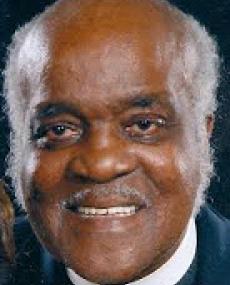
Sipo Elijah Mzimela was born on 19 June 1935, in Durban, Natal (now kwaZulu-Natal) to Allison and Maria Mzimela.
The entire family was raised as Anglicans and as a child, he wanted to become a priest. He obtained a degree from the University of South Africa that enabled him to teach.
He joined the African National Congress (ANC) and became involved in political protest against Apartheid. He left South Africa in 1962 and went into exile to several African countries, Czechoslovakia and Germany.
While living in Germany he married his first wife, Esther, and they had two daughters, Nomusa and Lindiwe.
Eventually Mzimela moved to the United States to study for his Master of Divinity degree at the General Theological Seminary. After being ordained as an Episcopal priest in 1976, he obtained a PhD in Ethics at New York University. He eventually settled in Atlanta and became an assisting priest at St. Bartholomew’s Episcopal Church.
Mzimela had a beautiful singing voice and he even cut a record in 1978, co-produced with Abdullah Ibrahim, titled Liberation: Freedom Songs .
He served at churches in New York and New Jersey and then the Episcopal Church sent him to teach at St. Paul’s Theological College in Kenya.
When he returned to the United States in 1986, he founded the South Africa Education Fund to help educate South African students. He also served as an associate priest at St. Bartholomew’s in Atlanta.
In 1989, while living in Atlanta, he divorced and married his second wife, Gail DeCosta, and became stepfather to her daughter, Julia.
He lived in New York for 10 years and served as the ANC representative to the United Nations.
In 1990, Mzimela returned to South Africa after 29 years in exile and much to his family’s surprise, suddenly joined the Inkatha Freedom Party (IFP).
The IFP’s Constitution was amended in 1995 so that he could be appointed as the IFP’s national deputy chair. This put him directly in the line of succession to the national chair, Frank Mdlalose.
He participated in the drafting of the first constitution for a democratic South Africa. After the elections, Mzimela was appointed Minister of Correctional Services in the South African government of national unity under Nelson Mandela, from 1994 to 1998.
It was under Mzimela’s direction that Robben Island, the primary political prison in South Africa, was closed. He also advocated for an instituted juvenile correctional facilities to protect incarcerated children from adult inmates.
However, following a spectacular falling-out with IFP leader Chief Mangosuthu Buthelezi, Mzimela was expelled from the IFP in 1999.
An IFP disciplinary hearing, held in Cape Town, found Mzimela guilty of bringing the party into disrepute. Mzimela continued in parliament, briefly as a United Democratic Movement representative, until he officially retired from politics in 2001.
Mzimela moved back to Atlanta, USA in 2002, where he served as an associate priest at St Bartholomew’s Church. He also taught in the Religious Studies Department at Agnes Scott College in Atlanta. He authored three books, Apartheid: South African Nazism, Wither South Africa and Marching to Slavery.
In 2006, he opened a craft shop in Atlanta called Pambili African Artworks, importing South African-made arts and crafts to sell in Atlanta.
Mzimela faced a lifelong struggle with diabetes, which led to the amputation of his leg in 2000 and numerous other health challenges. Sipo Elijah Mzimela, died on 2 February 2013 at Odyssey Hospice in Decatur (Atlanta), Georgia.
He is survived by his wife, Gail, sisters, Josephine and Brigid, daughters, Nomusa and Lindiwe, stepdaughter, Julia, granddaughter, Kanyisile, seven grandsons, nieces, nephews, and many other relatives and friends.